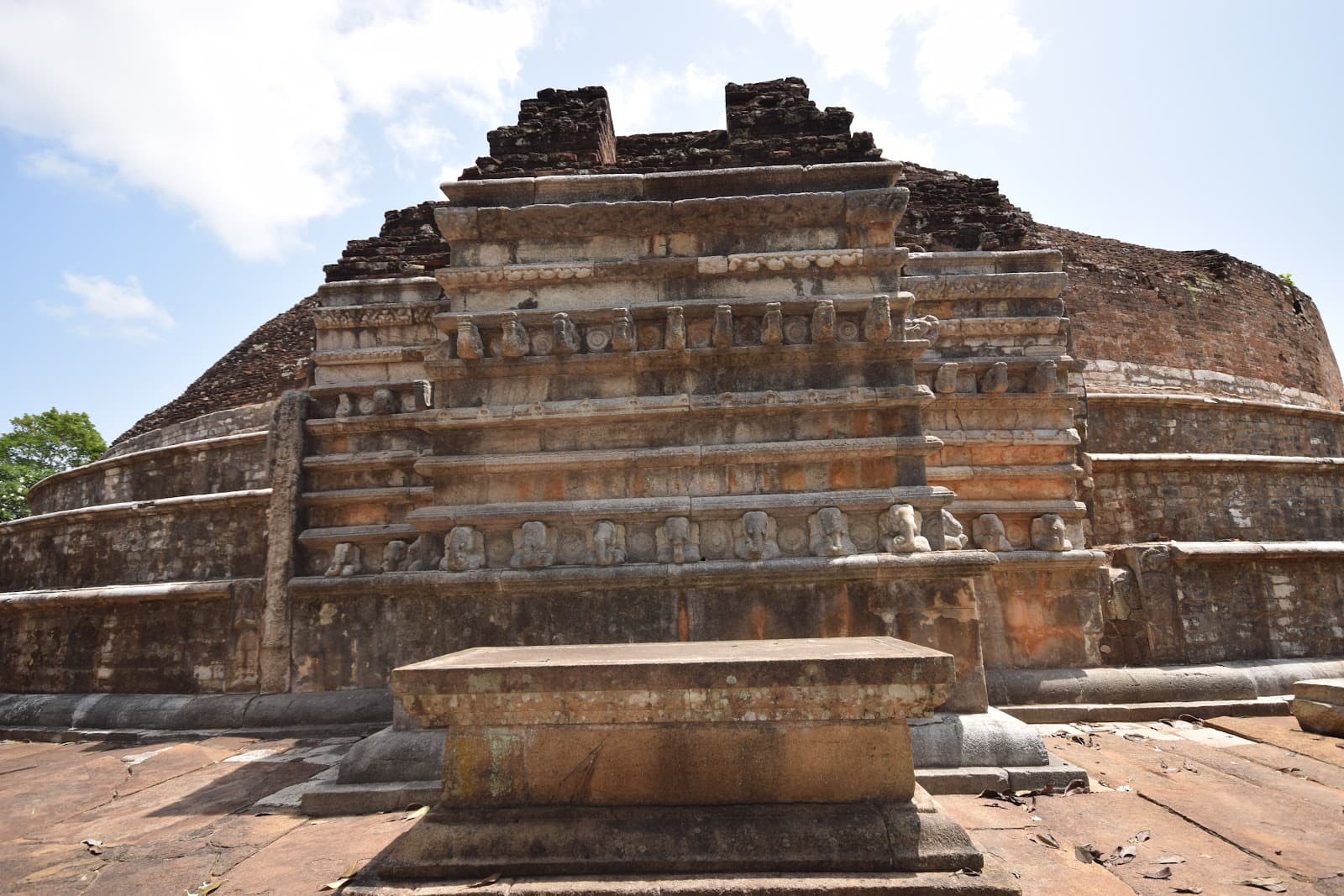
Kantaka Chetiya Mihintale
A masterpiece of ancient Sri Lankan architecture, Kantaka Chetiya boasts intricate carvings and early stupa design.
Highlights
Must-see attractions

Social
From TikTok & Reddit
Best Time
Beat the heat and crowds

Kantaka Chetiya Mihintale
Best Time
Beat the heat and crowds
Highlights
Must-see attractions
A masterpiece of ancient Sri Lankan architecture, Kantaka Chetiya boasts intricate carvings and early stupa design.
"A masterpiece of Sri Lankan architecture with unique carvings that showcase ancient multicultural relationships."
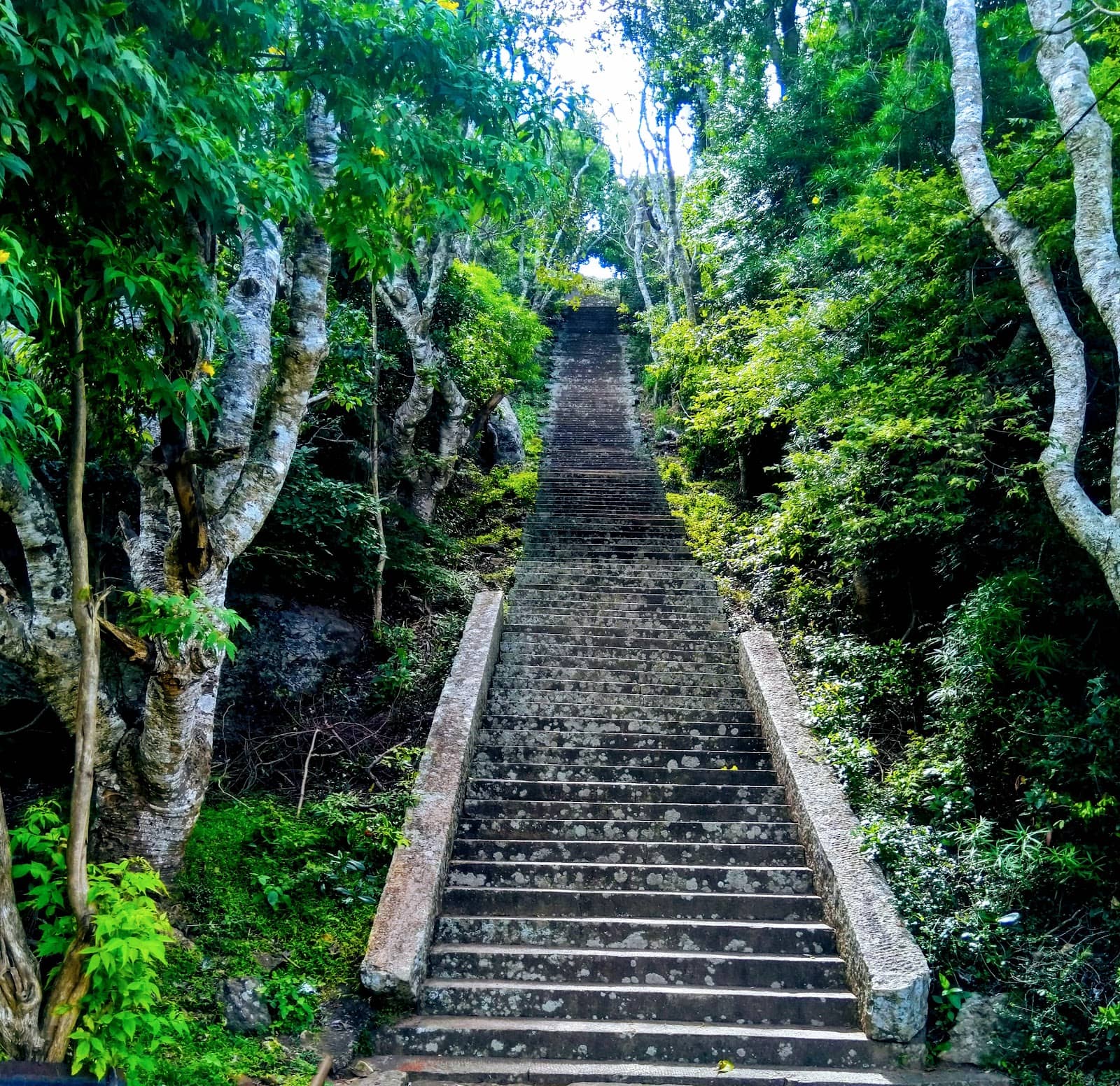
👟 Dress Modestly
Cover shoulders & knees. Remove shoes before entering sacred areas. :pray:
💧 Stay Hydrated
Carry water, especially during warmer months. The sun can be intense. :water_wave:
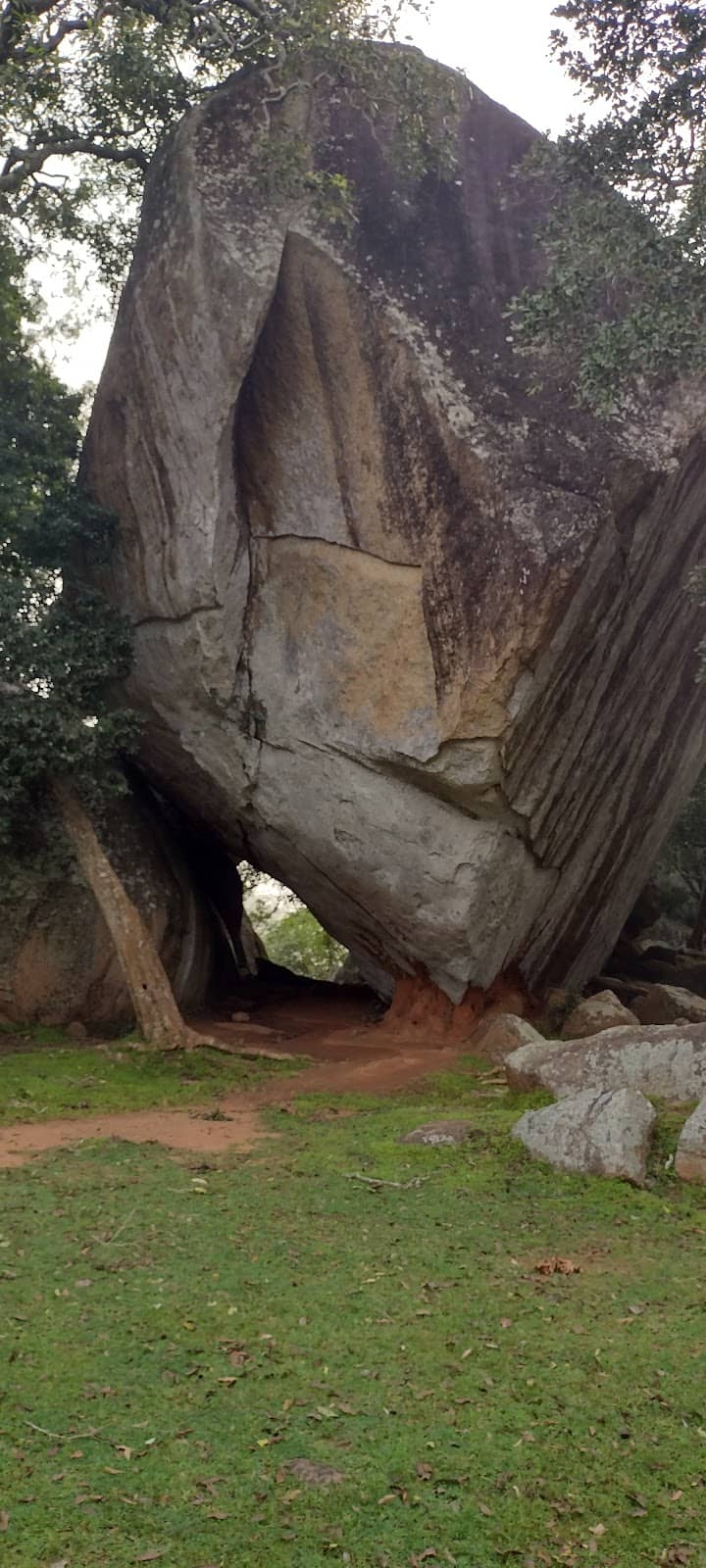
Highlights
Discover the most iconic attractions and experiences

Intricate Vaahalkada Carvings
Cardinal directions of the stupa
Marvel at the detailed sculptures of dwarfs, animals, and divine figures, including the unique elephant-headed deity.

Circular Stupa Architecture
Central structure
Admire the early architectural features of this circular stupa with its three stepped rims, a testament to ancient Sri Lankan craftsmanship.
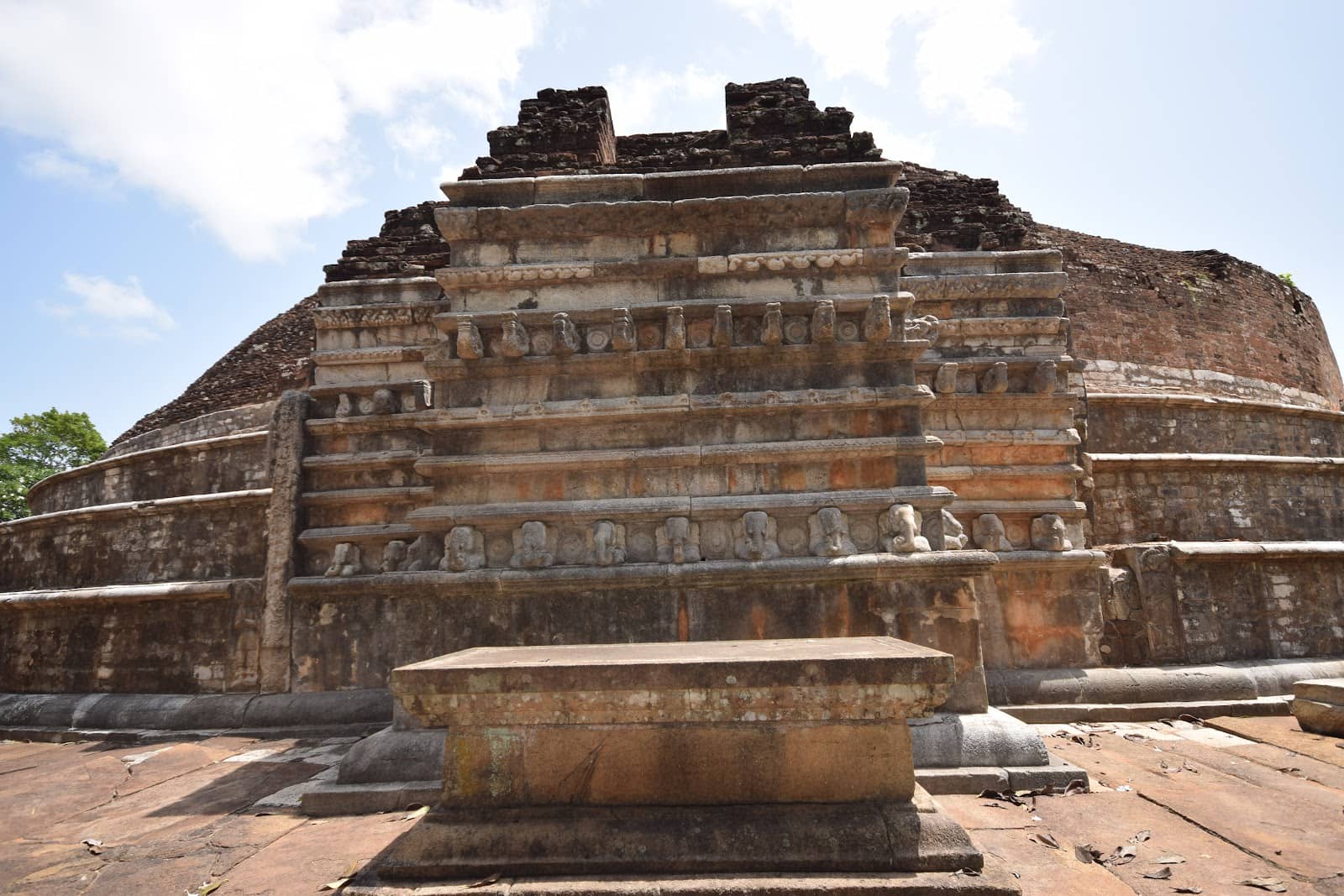
Historical Significance
Mihintale
Explore a site dating back to the 1st century BC, offering insights into early Buddhist architecture and cultural influences.
Plans like a pro.
Thinks like you
Planning Your Visit
Timing is Key for Ancient Wonders
Respectful Exploration
Best Times
Insider Tips
from TikTok, Instagram & Reddit
👟 Dress Modestly
Cover shoulders & knees. Remove shoes before entering sacred areas. :pray:
💧 Stay Hydrated
Carry water, especially during warmer months. The sun can be intense. :water_wave:
🚶♀️ Explore Mihintale
Combine your visit with other sites in Mihintale for a fuller experience. :compass:
📸 Capture the Details
Focus on the intricate carvings; they are the true stars. :camerawithflash:
Tips
from all over the internet
👟 Dress Modestly
Cover shoulders & knees. Remove shoes before entering sacred areas. :pray:
💧 Stay Hydrated
Carry water, especially during warmer months. The sun can be intense. :water_wave:
🚶♀️ Explore Mihintale
Combine your visit with other sites in Mihintale for a fuller experience. :compass:
📸 Capture the Details
Focus on the intricate carvings; they are the true stars. :camerawithflash:
What Travellers Say
Reviews Summary
Visitors praise Kantaka Chetiya for its remarkable ancient architecture and the incredibly detailed, unique carvings on its Vaahalkada, especially the elephant-headed deity. It's highlighted as a masterpiece of Sri Lankan craftsmanship with significant historical value, making it an important site for understanding early Buddhist art and culture. Some find the site less developed compared to other major attractions, but its historical and artistic merit is undeniable.
"Kantaka Cetiya is a circular stupa having a base circumference of about 425 feet. It has three stepped rims. It has four frontispieces in the four cardinal directions.
The frontispiece is called Vaahalkada. All the Vaahalkadas are decorated with dwarfs, animals, human, divine figures and floral motifs. One of the most important sculptures on the Kantaka Cethiya Vaahalkada is the elephant-headed God with two arms. The Saivites call it Ganapati or Ganeesaa. The Ganapati sculptures in the Vaahalkadas of the Kantaka Cetiya have created confusion among archaeologists and historians. No one could not explain the connection between Ganapati God and Buddhism. Thus, the Sinhalese historians and archaeologists have tried to give some imaginary interpretation.
The Sinhalese archaeologists and historians say that King Suratissa has built this Stupa. The Pesavalalu and the frontispiece have been preserved to a great extent. There are ruins of the Stupa, which are 40 ft (12 m) in height. The monks would have resided in the caves close to the Stupa as King Lajjitissa renovated this Stupa. There is no doubt that this belongs to the 1st century B.C."
Sandul Punchihewa
"The Kanthaka Chetiya can be considered as one of the stupas depicting the earliest architectural features of the stupas in Sri Lanka. Though the founder of this chetiya is not known. as inscription of King Makadhathika Mahanaga and King Bhatika Abhaya records the name of the stupa as Kataka Ceta. According to the Mahavansa King Devanapethis (250-210 BC) built sixty eight caves near the Kanthakaa Chetiya and King Lanjaka Tissa (119-109 BC) had a stone mantle made to cover it up."
Udara Madhuranga
"This is a Masterpiece of Sri Lankan architecture. The carvings of The Vahalkada's of Kantaka Chethiya stupa is unique and it shows the multicultural relationship Sri lanka had since it's ancient days."
Dulaj Ranasinghe
What People Like
What People Dislike
Frequently Asked Questions
🚇 🗺️ Getting There
Kantaka Chetiya is located within the larger Mihintale complex, near Anuradhapura. You can hire a tuk-tuk or taxi from Anuradhapura town to reach Mihintale. Many visitors combine a visit to Kantaka Chetiya with other significant sites in Mihintale, such as the stairway to the main temple and the Naga Pokuna. The journey from Anuradhapura typically takes about 30-45 minutes.
Yes, there are parking facilities available at the base of Mihintale, where you can leave your vehicle before ascending to the various sites, including Kantaka Chetiya. Parking is usually managed by local vendors or the site authorities.
Walking from Anuradhapura to Mihintale is not recommended due to the distance (approximately 15-20 km). It's best to use local transport like a tuk-tuk, taxi, or a rented car to reach the site comfortably.
Many visitors find it convenient to hire a tuk-tuk for a few hours to explore the entire Mihintale complex, including Kantaka Chetiya. This allows for flexibility and easy access between different points of interest. Alternatively, you can walk between some of the closer sites once you are within the Mihintale area.
🎫 🎫 Tickets & Entry
Yes, there is an entrance fee for the Mihintale archaeological site, which includes access to Kantaka Chetiya. The ticket price is generally affordable and can be purchased at the main entrance to the Mihintale complex. It's advisable to check the current ticket prices upon arrival.
Kantaka Chetiya, as part of the Mihintale sacred area, is generally accessible from early morning until late afternoon or early evening. Specific hours can vary, but it's typically open from around 7:00 AM to 6:00 PM. It's best to confirm the exact timings when you plan your visit.
Yes, as a sacred Buddhist site, a modest dress code is required. Visitors must cover their shoulders and knees. It is also customary to remove footwear before entering certain areas of the stupa and surrounding religious sites. :pray:
Visiting during religious festivals can offer a unique cultural experience, but it may also mean larger crowds. If you prefer a quieter visit, it's best to avoid major Buddhist holidays. However, experiencing the site during a festival can be very rewarding.
Photography is generally permitted at Kantaka Chetiya for personal use. However, it's important to be respectful and avoid intrusive photography, especially of devotees or monks. Always be mindful of the sacred nature of the site.
🎫 🧭 Onsite Experience
Kantaka Chetiya is renowned for its well-preserved Vaahalkada (frontispieces) adorned with intricate sculptures, including unique depictions of dwarfs, animals, and the elephant-headed deity. It's considered a masterpiece of Sri Lankan architecture and showcases early stupa construction techniques. The site holds significant historical and archaeological value, dating back to the 1st century BC.
To fully appreciate Kantaka Chetiya and its intricate carvings, allocate at least 30-45 minutes. If you are exploring the broader Mihintale complex, you'll need several hours. Many visitors spend half a day or more exploring the various stupas, caves, and viewpoints.
Official guides are often available at the main entrance of the Mihintale complex. Hiring a local guide can greatly enhance your understanding of the history, architecture, and cultural significance of Kantaka Chetiya and the surrounding sites. Negotiate the price beforehand.
The Vaahalkada with its detailed carvings offer excellent photographic opportunities. Try to capture the stupa from different angles, especially during the golden hours of sunrise or sunset for dramatic lighting. The surrounding landscape also provides beautiful backdrops. :camerawithflash:
Mihintale, including Kantaka Chetiya, involves climbing stairs and uneven terrain. While the main stupa area is relatively flat, reaching it might require navigating some inclines. It may be challenging for individuals with significant mobility issues. :wheelchair:
🍽️ 🍽️ Food & Dining
There are limited food options directly at Kantaka Chetiya. However, you can find small eateries and drink stalls at the base of Mihintale, near the main entrance, offering local snacks and beverages. For a wider selection of restaurants, it's best to head back to Anuradhapura town.
The food options near Mihintale are typically local Sri Lankan snacks, short eats, and refreshing drinks like king coconut water. If you're looking for a full meal, you'll find more variety in Anuradhapura.
It's highly recommended to bring your own water, especially if you plan to spend a significant amount of time exploring Mihintale. Carrying some snacks is also a good idea, as food options can be sparse and may close early.
📸 📸 Photography
The best times for photography are early morning and late afternoon. The soft light during these 'golden hours' enhances the details of the carvings and the stupa's form, creating a more atmospheric and visually appealing image. Midday sun can be harsh and create strong shadows.
A wide-angle lens is useful for capturing the entire stupa and its surroundings. A macro lens or a good zoom lens can help you get detailed shots of the intricate carvings on the Vaahalkada. A tripod can be beneficial for low-light conditions, but be mindful of any restrictions.
Definitely focus on the unique Vaahalkada sculptures, especially the elephant-headed deity, dwarfs, and floral motifs. Also, capture the circular form of the stupa, the stepped rims, and the overall ancient atmosphere of the site. Look for interesting textures and patterns in the stonework.
Lighting can be quite bright during midday, leading to harsh shadows. Early morning and late afternoon offer softer, more diffused light that is ideal for photography. The stupa is generally well-lit by natural sunlight throughout the day.
Drone usage is often restricted at archaeological and religious sites in Sri Lanka to preserve the sanctity and prevent disturbance. It's best to check with local authorities or site management before attempting to fly a drone. Unauthorized drone use can lead to penalties.
For Different Travelers
Tailored advice for your travel style
👨👩👧 Families with Kids
Encourage kids to look for different animals and characters in the stone carvings. The sheer scale of the stupa can also be awe-inspiring. Remember to dress modestly and carry plenty of water, as exploring the site can involve some walking. Visiting early in the morning can help avoid the heat and keep children more comfortable.
🏛️ History Buffs & Archaeology Enthusiasts
Take your time to examine the details of the carvings and consider the historical context provided by inscriptions and chronicles. The site's dating to the 1st century BC makes it a significant landmark for understanding the early Anuradhapura period and its cultural influences.
Deep Dives
In-depth insights and expert knowledge
The Enigmatic Ganapati Sculptures
Various interpretations have been proposed, with Sinhalese historians attempting to reconcile this apparent contradiction. The exact connection between Ganapati and Buddhism at this site remains a subject of debate, highlighting the complex cultural and religious exchanges that occurred in ancient Sri Lanka. These sculptures are a unique feature that sets Kantaka Chetiya apart.
These carvings are not just religious symbols but also artistic masterpieces, showcasing the skill of ancient artisans. The detailed depiction of dwarfs, animals, and divine figures on the Vaahalkada offers a glimpse into the rich tapestry of beliefs and artistic traditions of the era.
Architectural Significance and History
While the original founder of the stupa is unknown, inscriptions mention it as 'Kataka Ceta' during the reigns of King Makadhathika Mahanaga and King Bhatika Abhaya. Historical chronicles like the Mahavamsa suggest that King Devanampiyatissa (250-210 BC) built sixty-eight caves near the stupa, and King Lajjitissa (119-109 BC) later commissioned a stone mantle to cover it. This indicates continuous patronage and importance of the site over centuries.
The stupa's ruins stand approximately 40 feet in height, preserving much of its original grandeur. The preservation of the Pesavalalu (stepped rims) and the Vaahalkadas allows visitors to appreciate the architectural brilliance and the artistic merit of this ancient monument, which is believed to date back to the 1st century BC.
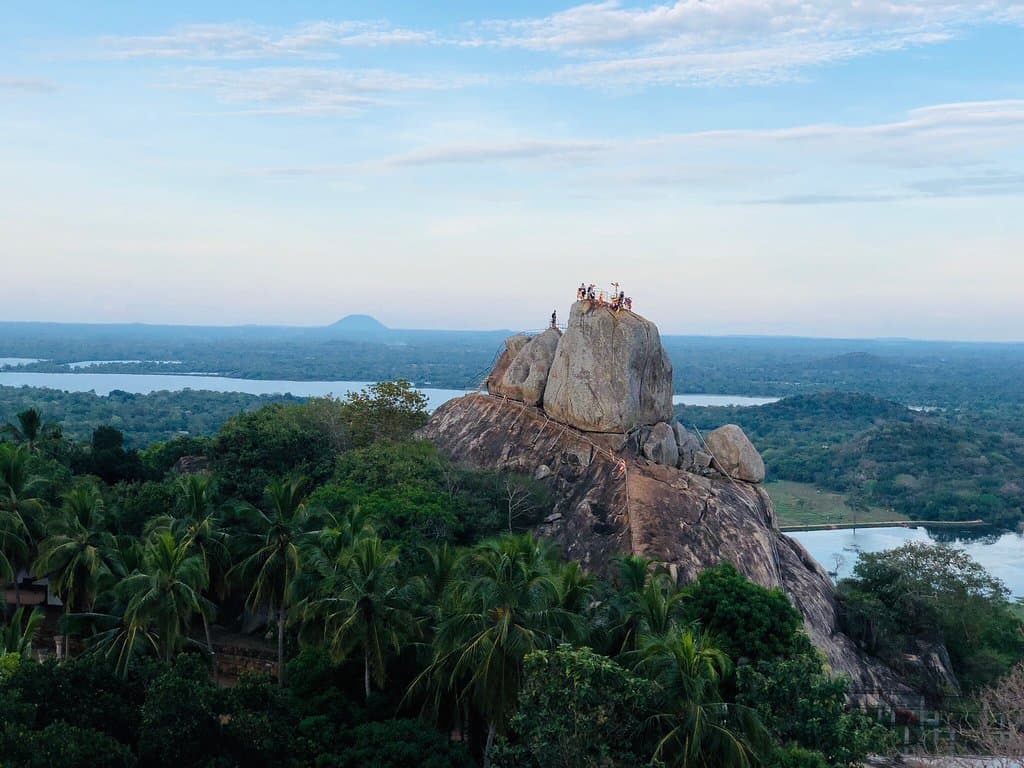


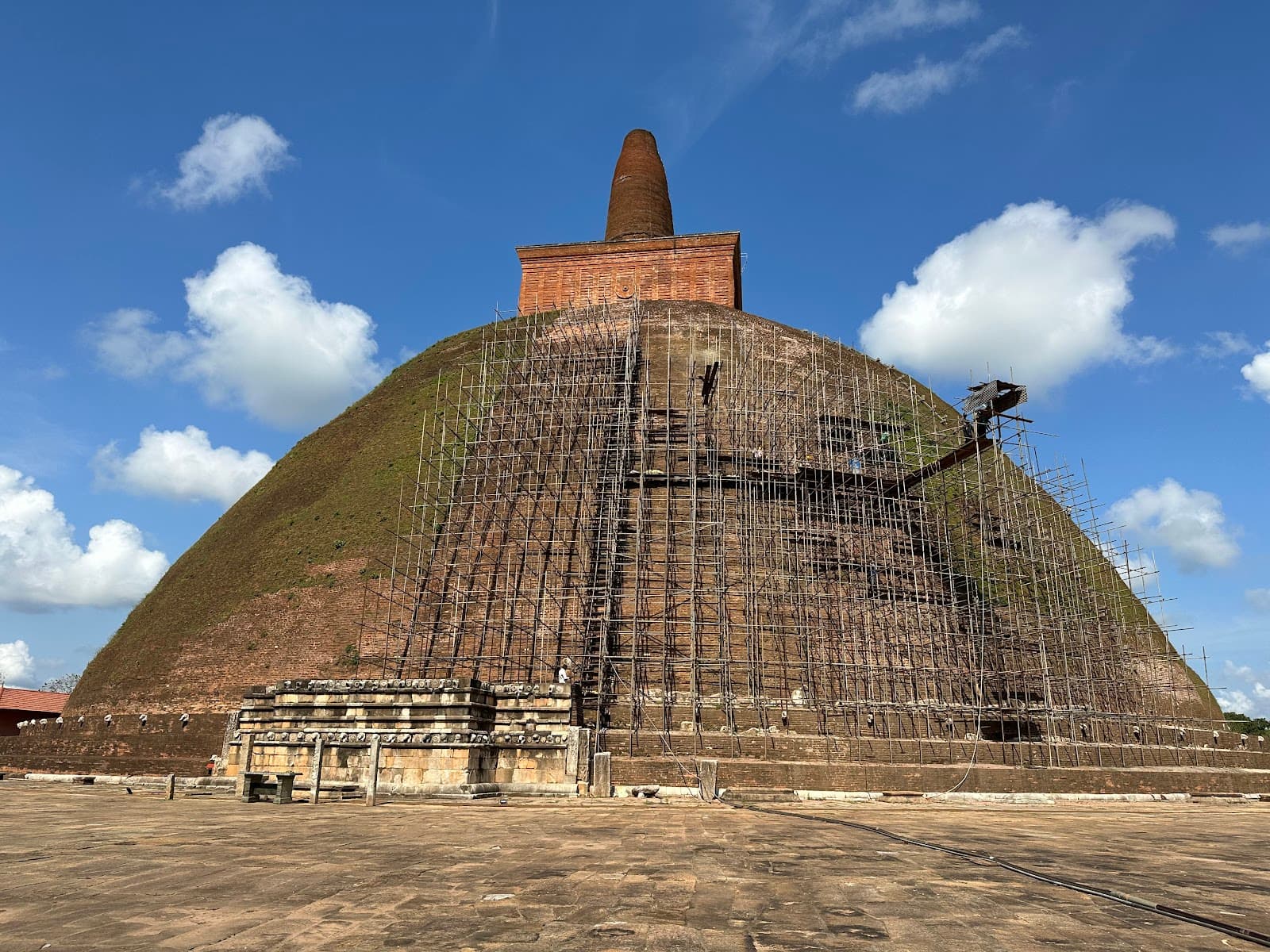
Social
from TikTok, Instagram & Reddit